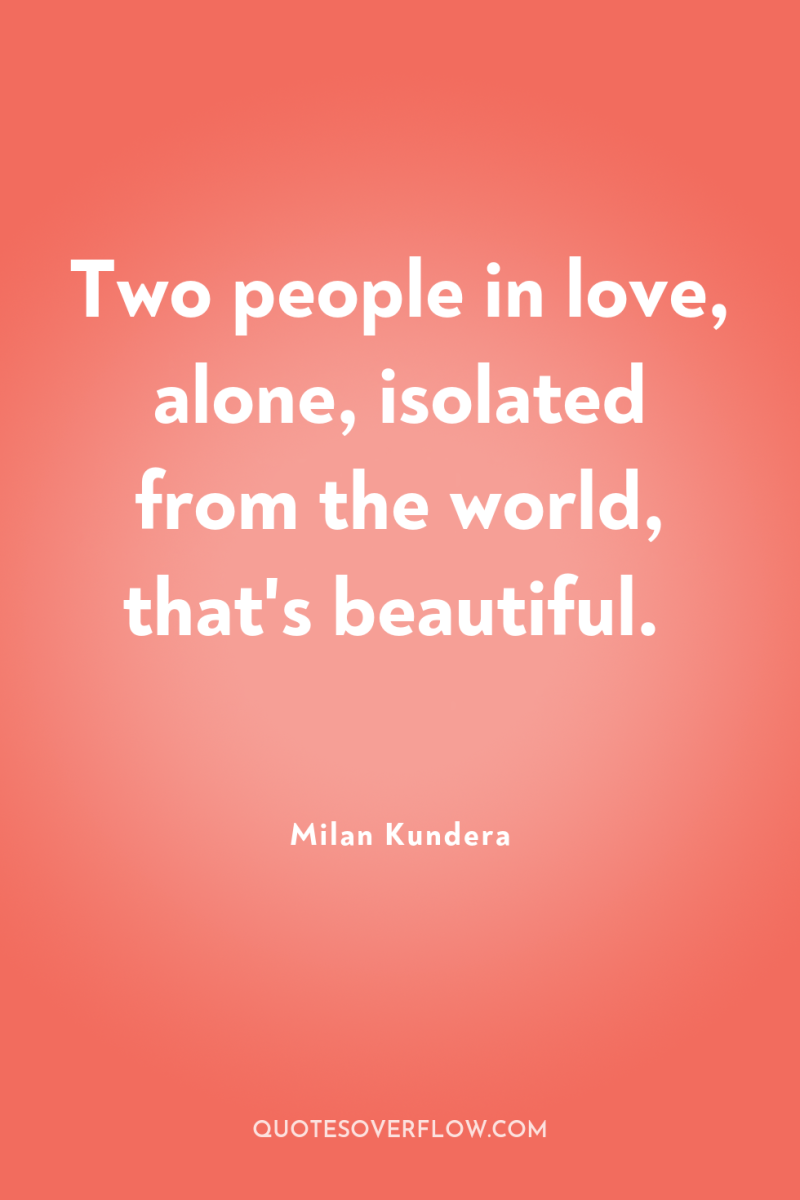
1
Two people in love, alone, isolated from the world, that's beautiful.Milan Kundera
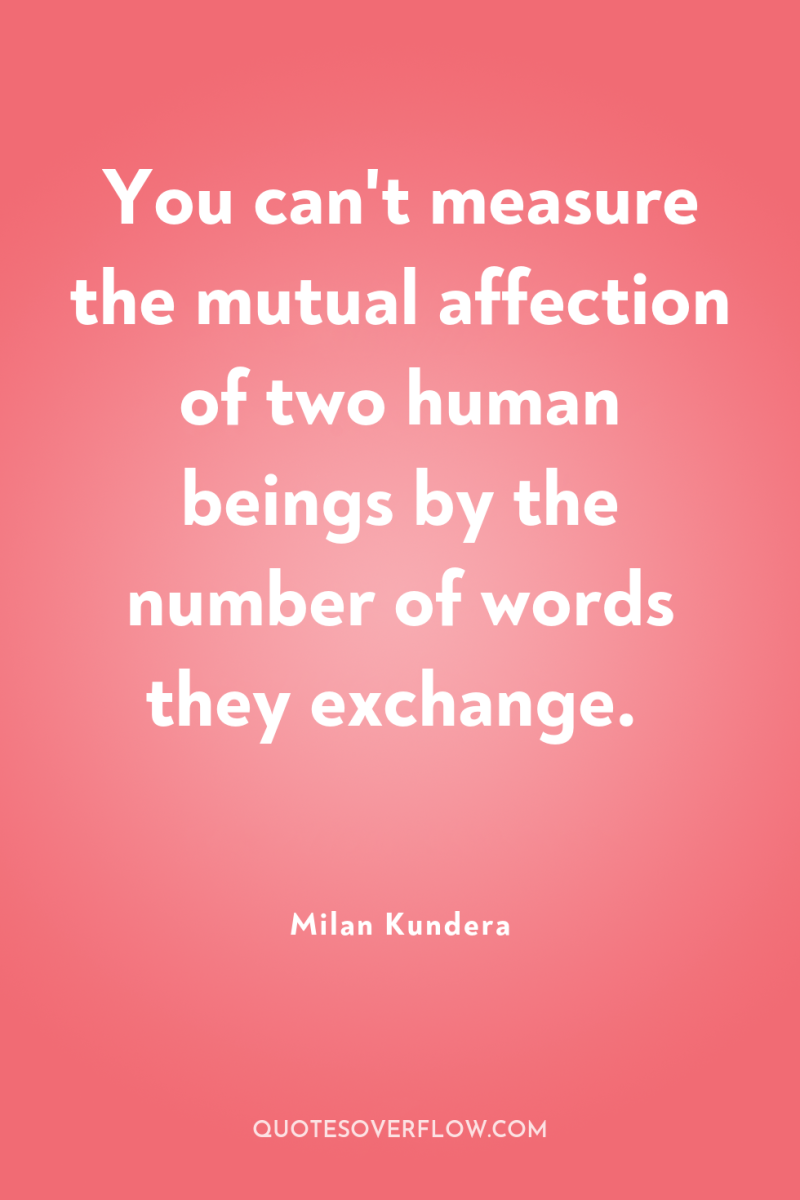
2
You can't measure the mutual affection of two human beings by the number of words they exchange.Milan Kundera
3
Making love with a woman and sleeping with a woman are two separate passions, not merely different but opposite. Love does not make itself felt in the desire for copulation (a desire that extends to an infinite number of women) but in the desire for shared sleep (a desire limited to one woman).Milan Kundera
4
He suddenly recalled from Plato's Symposium: People were hermaphrodites until God split then in two, and now all the halves wander the world over seeking one another. Love is the longing for the half of ourselves we have lost.Milan Kundera
5
I want you to be weak. As weak as I am.Milan Kundera

6
Oh lovers! be careful in those dangerous first days! once you've brought breakfast in bed you'll have to bring it forever, unless you want to be accused of lovelessness and betrayal.Milan Kundera

7
Physical love is unthinkable without violence.Milan Kundera
8
Perhaps all the questions we ask of love, to measure, test, probe, and save it, have the additional effect of cutting it short. Perhaps the reason we are unable to love is that we yearn to be loved, that is, we demand something (love) from our partner instead of delivering ourselves up to him demand-free and asking for nothing but his company.Milan Kundera
9
Does he love me? Does he love anyone more than me? Does he love me more than I love him? Perhaps all the questions we ask of love, to measure, test, probe, and save it, have the additional effect of cutting it short. Perhaps the reason we are unable to love is that we yearn to be loved, that is, we demand something (love) from our partner instead of delivering ourselves up to him demand-free and asking for nothing but his company.Milan Kundera
10
Perhaps the reason we are unable to love is that we yearn to be loved, that is, we demand something (love) from our partner instead of delivering ourselves up to him demand-free and asking for nothing but his company.Milan Kundera
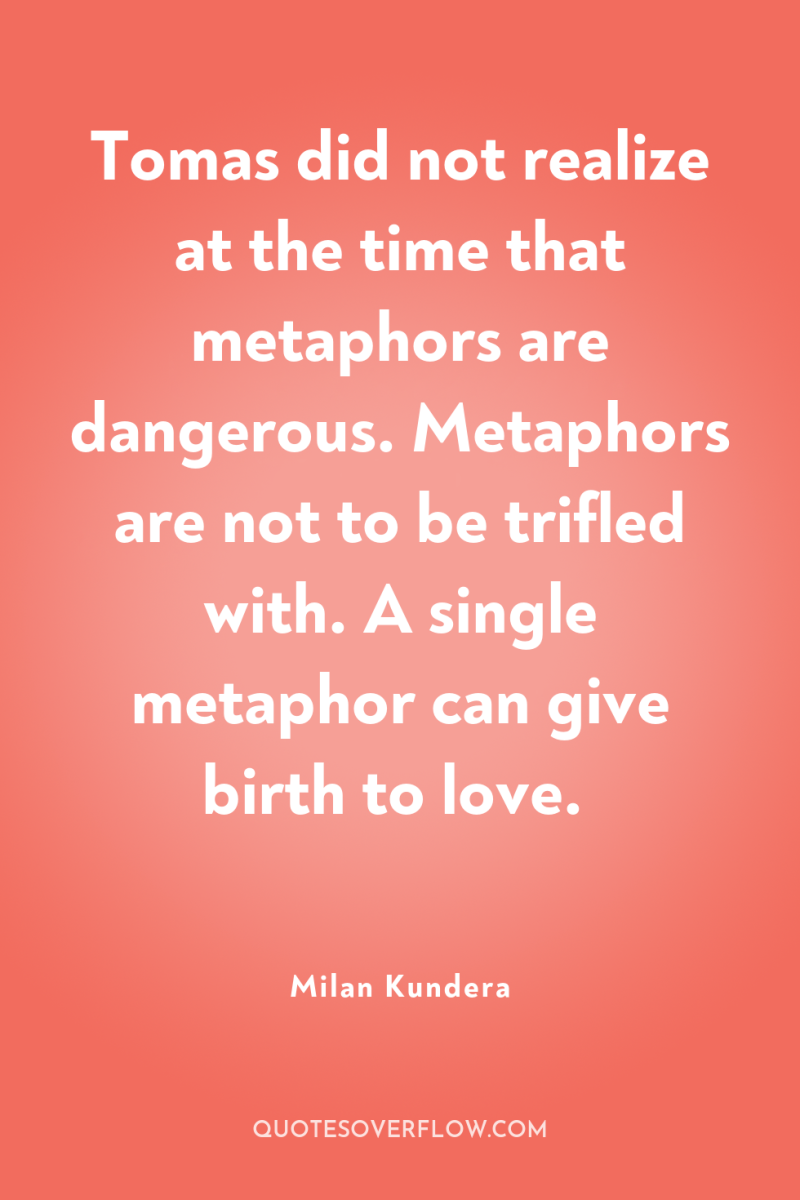
11
Tomas did not realize at the time that metaphors are dangerous. Metaphors are not to be trifled with. A single metaphor can give birth to love.Milan Kundera

12
...because love is continual interrogation. I don't know of a better definition of love.Milan Kundera
13
Einmal ist keinmal, says Tomas to himself. What happens but once, says the German adage, might as well not have happened at all. If we have only one life to live, we might as well not have lived at all.Milan Kundera
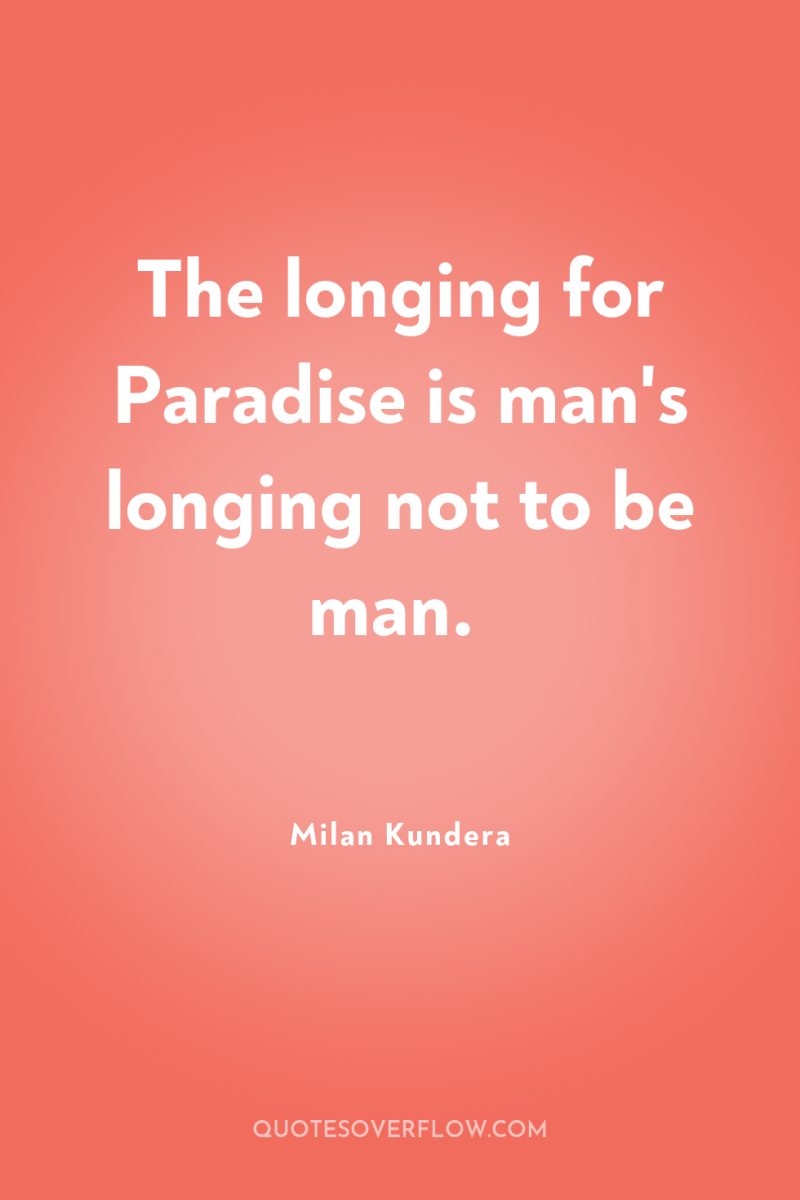
14
The longing for Paradise is man's longing not to be man.Milan Kundera
15
For Sabina, living in truth, lying neither to ourselves nor to others, was possible only away from the public: the moment someone keeps an eye on what we do, we involuntarily make allowances for that eye, and nothing we do is truthful. Having a public, keeping a public in mind, means living in lies.Milan Kundera

16
What does it mean to live in truth? Putting it negatively is easy enough: it means not lying, not hiding, and not dissimulating.Milan Kundera
17
Spontaneously, without any theological training, I, a child, grasped the incompatibility of God and shit and thus came to question the basic thesis of Christian anthropology, namely that man was created in God's image. Either/or: either man was created in God's image - and has intestines! - or God lacks intestines and man is not like him. The ancient Gnostics felt as I did at the age of five. In the second century, the Great Gnostic master Valentinus resolved the damnable dilemma by claiming that Jesus "ate and drank, but did not defecate." Shit is a more onerous theological problem than is evil. Since God gave man freedom, we can, if need be, accept the idea that He is not responsible for man's crimes. The responsibility for shit, however, rests entirely with Him, the creator of man.Milan Kundera
18
If excitement is a mechanism our Creator uses for His own amusement, love is something that belongs to us alone and enables us to flee the Creator. Love is our freedom. Love lies beyond "Es Muss sein!Milan Kundera

19
(God) being the old man invented in order to, and with whom to, hold long conversations.Milan Kundera
20
Those who had fought for what they called the revolution maintained a great pride: the pride of being on the correct side of the front lines. Ten or twelve years later (around the time of our story) the front lines began to melt away, and with them the correct side. No wonder the former supporters of the revolution feel cheated and are quick to seek substitute fronts; thanks to religion they can (in their role as atheists struggling against believers) stand again on the correct side and retain their habitual and precious sense of their own superiority. But to tell the truth, the substitute front was also useful to others, and it will perhaps not be too premature to disclose that Alice was one of them. Just as the directress wanted to be on the correct side, Alice wanted to be on the opposite side. During the revolution they had nationalized her papa's shop, and Alice hated those who had done this to him. But how should she show her hatred? Perhaps by taking a knife and avenging her father? But this sort of thing is not the custom in Bohemia. Alice had a better means for expressing her opposition: she began to believe in God.Milan Kundera
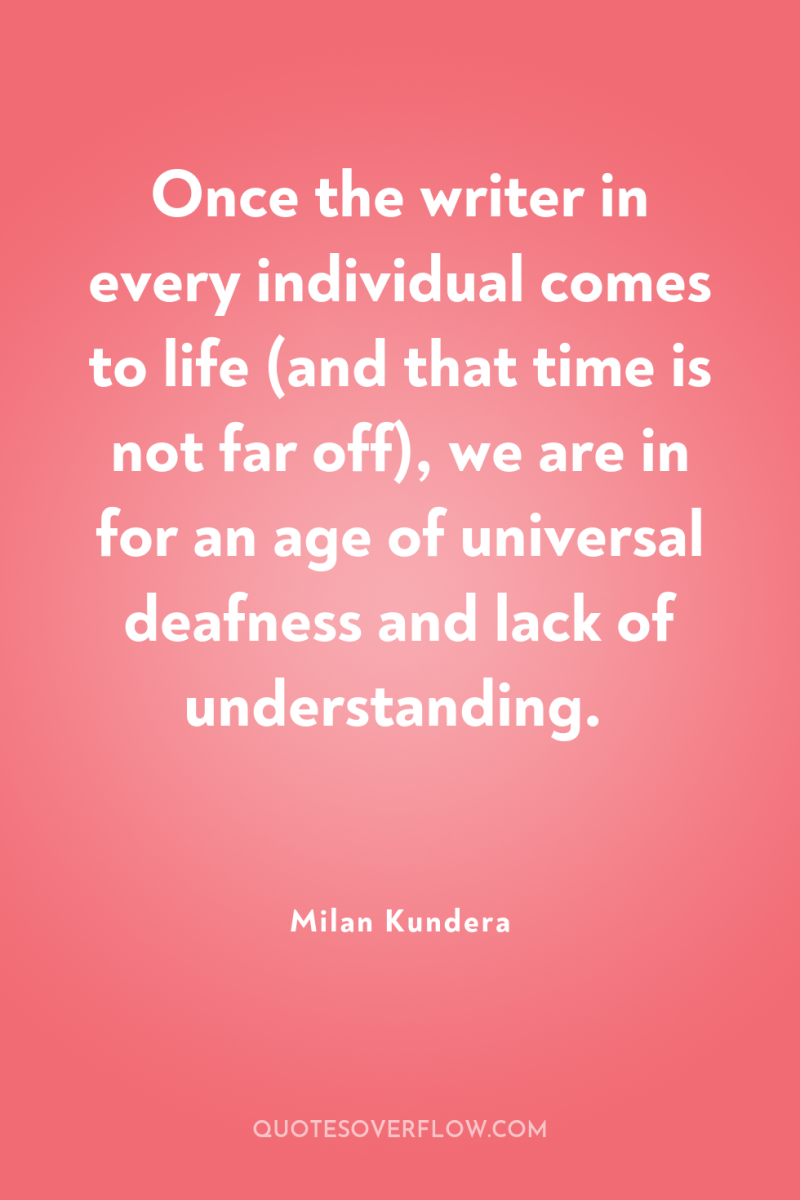
21
Once the writer in every individual comes to life (and that time is not far off), we are in for an age of universal deafness and lack of understanding.Milan Kundera
22
When Don Quixote went out into the world, that world turned into a mystery before his eyes. That is the legacy of the first European novel to the entire subsequent history of the novel. The novel teaches us to comprehend the world as a question. There is wisdom and tolerance in that attitude.Milan Kundera

23
Yes, it's a well-known fact about you: you're like death, you take everything.Milan Kundera

24
Dogs do not have many advantages over people, but one of them is extremely important: euthanasia is not forbidden by law in their case; animals have the right to a merciful death.Milan Kundera
25
Yes, it was too late, and Sabina knew she would leave Paris, move on, and on again, because were she to die here they would cover her up with a stone, and in the mind of a woman for whom no place is home the thought of an end to all flight is unbearable.Milan Kundera
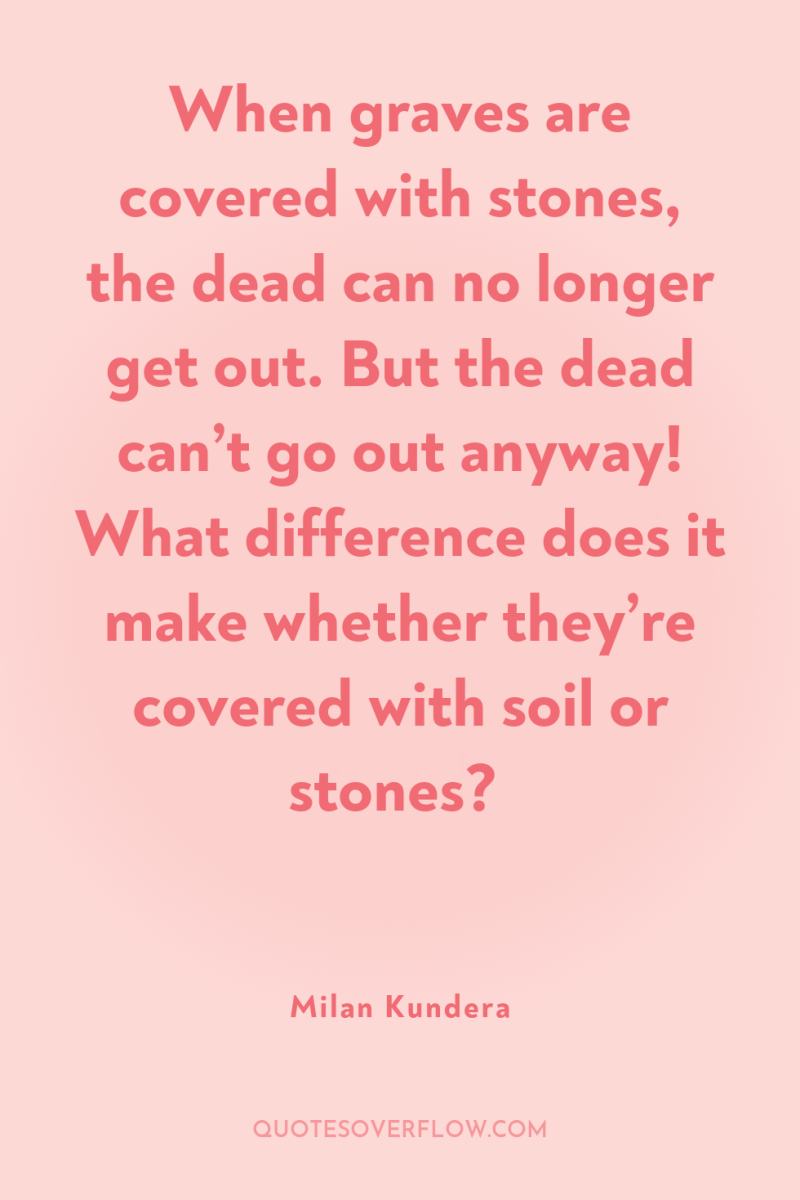
26
When graves are covered with stones, the dead can no longer get out. But the dead can’t go out anyway! What difference does it make whether they’re covered with soil or stones?Milan Kundera
27
The characters in my novels are my own unrealised possibilities. That is why I am equally fond of them all and equally horrified by them. Each one has crossed a border that I myself have circumvented.Milan Kundera
28
Too much faith is the worst ally. When you believe in something literally, through your faith you'll turn it into something absurd. One who is a genuine adherent, if you like, of some political outlook, never takes its sophistries seriously, but only its practical aims, which are concealed beneath these sophistries. Political rhetoric and sophistries do not exist, after all, in order that they be believed; rather, they have to serve as a common and agreed upon alibi. Foolish people who take them in earnest sooner or later discover inconsistencies in them, begin to protest, and finish finally and infamously as heretics and apostates. No, too much faith never brings anything good..Milan Kundera

29
But isn't it true that an author can write only about himself?Milan Kundera
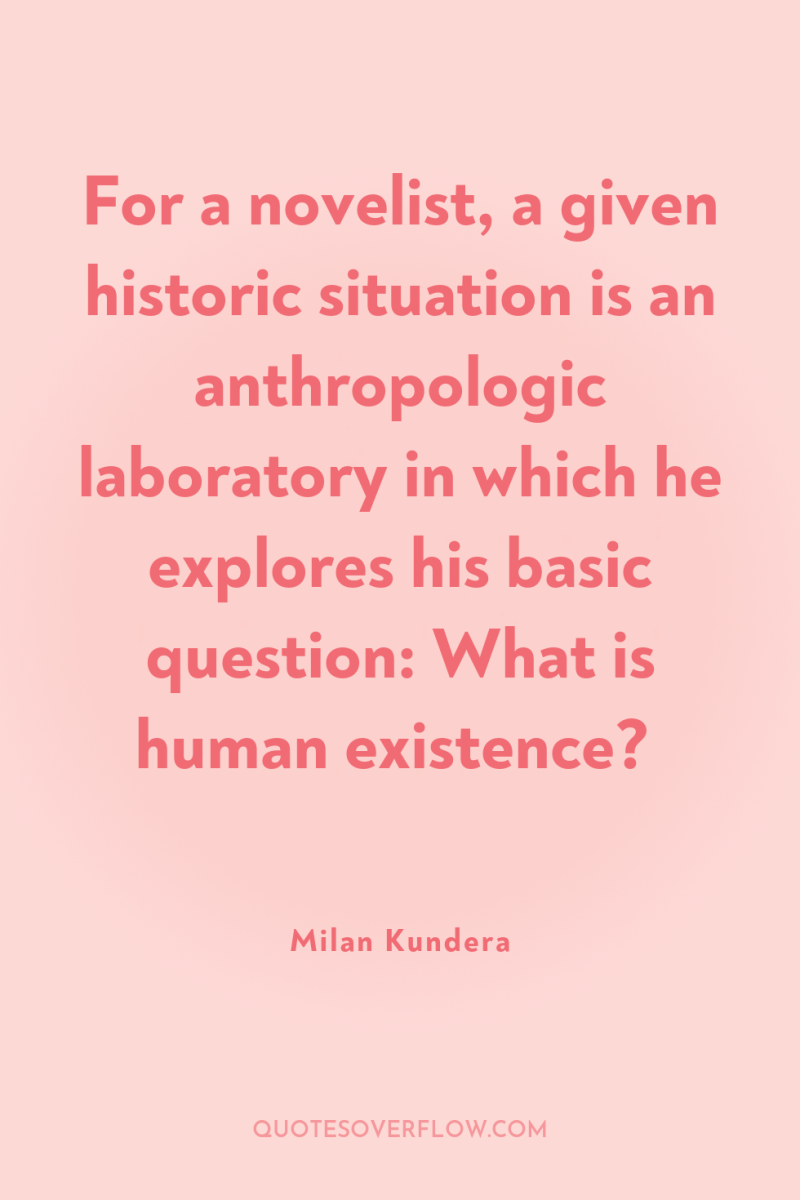
30
For a novelist, a given historic situation is an anthropologic laboratory in which he explores his basic question: What is human existence?Milan Kundera
31
The novel was born with the Modern Era, which made man, to quote Heidegger, the "only real subject, " the ground for everything. It is largely through the novel that man as an individual was established on the European scene. Away from the novel, in our real lives, we know very little about our parents as they were before our birth; we have only fragmentary knowledge of the people close to us: we see them come and go and scarcely have they vanished than their place is taken over by others: they form a long line of replaceable beings. Only the novel separates out an individual, trains a light on his biography, his ideas, his feelings, makes him irreplaceable: makes him the center of everything. .Milan Kundera
32
Of course, even before Flaubert, people knew stupidity existed, but they understood it somewhat differently: it was considered a simple absence of knowledge, a defect correctable by education. In Flaubert's novels, stupidity is an inseparable dimension of human existence. It accompanies poor Emma throughout her days, to her bed of love and to her deathbed, over which two deadly agélastes, Homais and Bournisien, go on endlessly trading their inanities like a kind of funeral oration. But the most shocking, the most scandalous thing about Flaubert's vision of stupidity is this: Stupidity does not give way to science, technology, modernity, progress; on the contrary, it progresses right along with progress!.Milan Kundera
33
Anyone whose goal is 'something higher' must expect someday to suffer vertigo. What is vertigo? Fear of falling? No, Vertigo is something other than fear of falling. It is the voice of the emptiness below us which tempts and lures us, it is the desire to fall, against which, terrified, we defend ourselves.Milan Kundera
34
The girl was grateful to the young man for every bit of flattery; she wanted to linger for a moment in its warmth and so she said, 'You're very good at lying.'' Do I look like a liar?'' You look like you enjoy lying to women, ' said the girl, and into her words there crept unawares a touch of the old anxiety, because she really did believe that her young man enjoyed lying to women.Milan Kundera
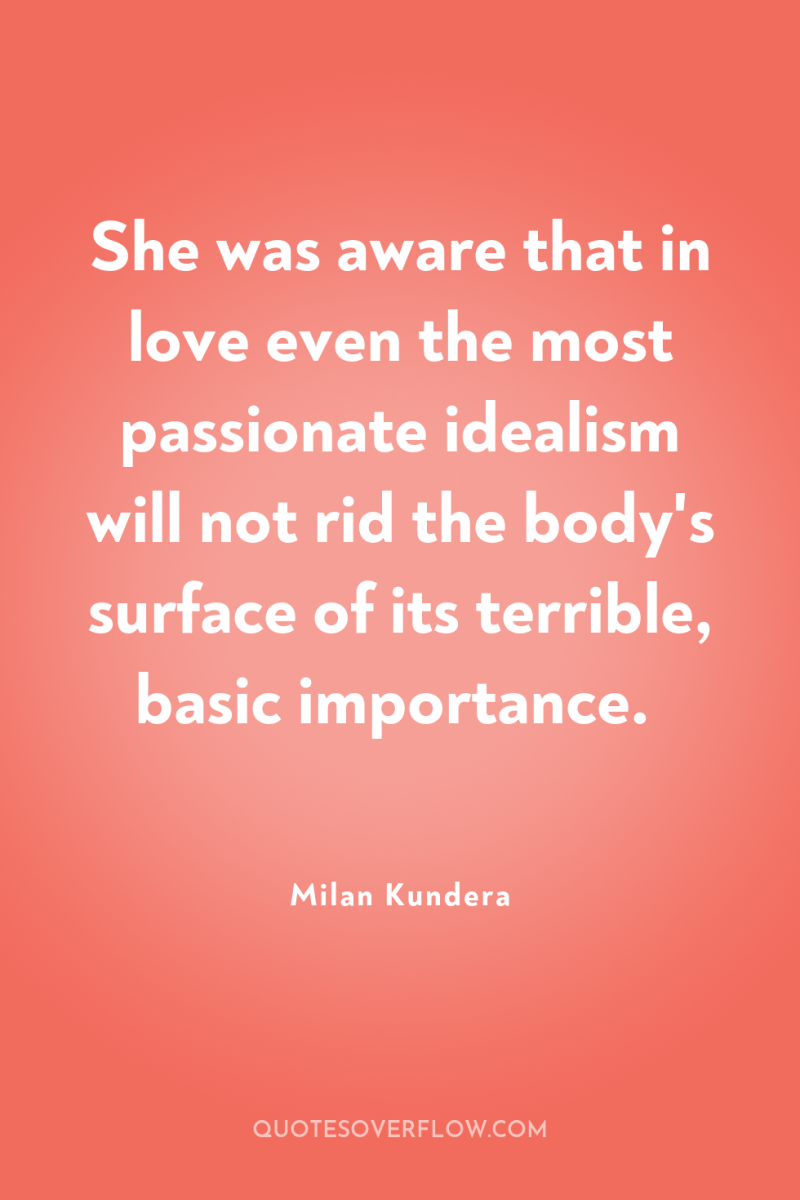
35
She was aware that in love even the most passionate idealism will not rid the body's surface of its terrible, basic importance.Milan Kundera
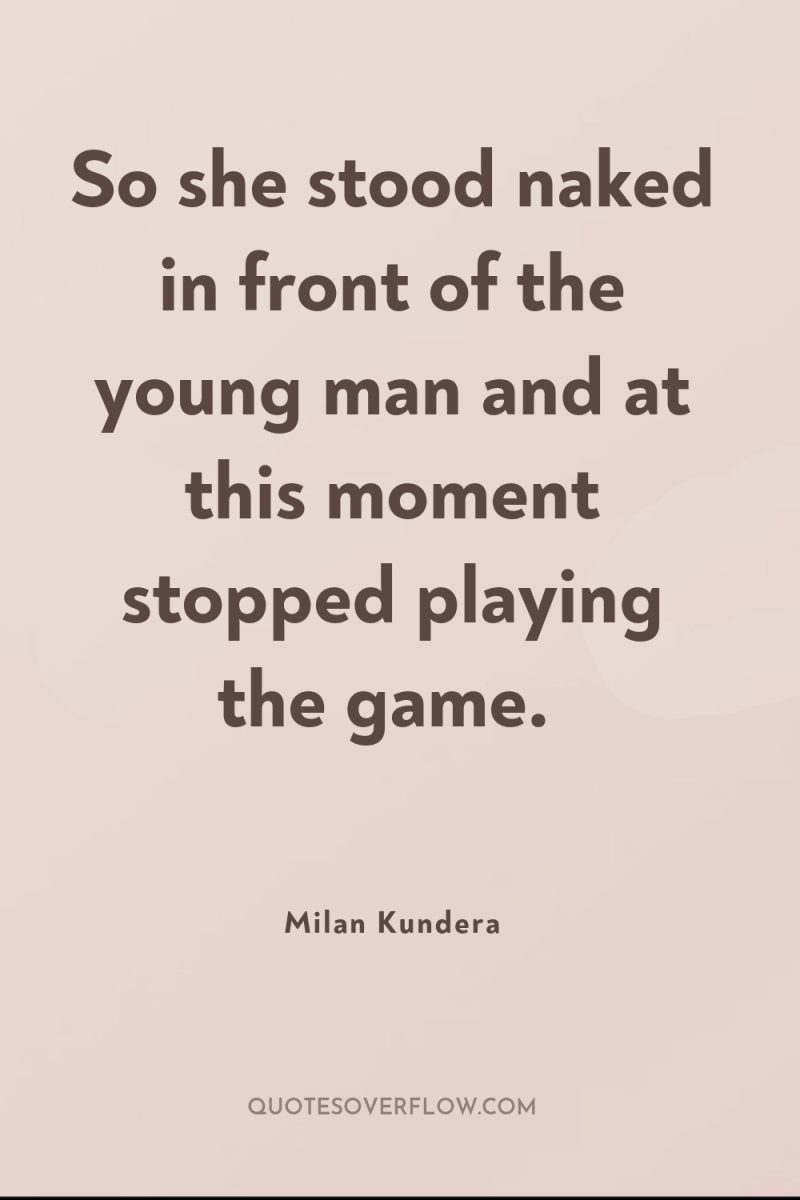
36
So she stood naked in front of the young man and at this moment stopped playing the game.Milan Kundera
37
The engineer’s ready capitulation, however, did not hide from the poet’s mother the sad realization that the adventure into which she had plunged so impulsively--and which had seemed so intoxicatingly beautiful--had no turned out to be the great, mutually fulfilling love she was convinced she had a full right to expect. Her father was the owner of two prosperous Prague pharmacies, and her morality was based on strict give-and-take. For her part, she had invested everything in love (she had even been willing to sacrifice her parents and their peaceful existence); in turn, she had expected her partner to invest an equal amount of capital of feelings in the common account. To redress the imbalance, she gradually withdrew her emotional deposit and after the wedding presented a proud, severe face to her husband. .Milan Kundera
38
Children, Never look Back! " and this meant that we must never allow the future to be weighed down by memory . for children have no past, and that is the whole secret of the magical innocence of their smiles.Milan Kundera
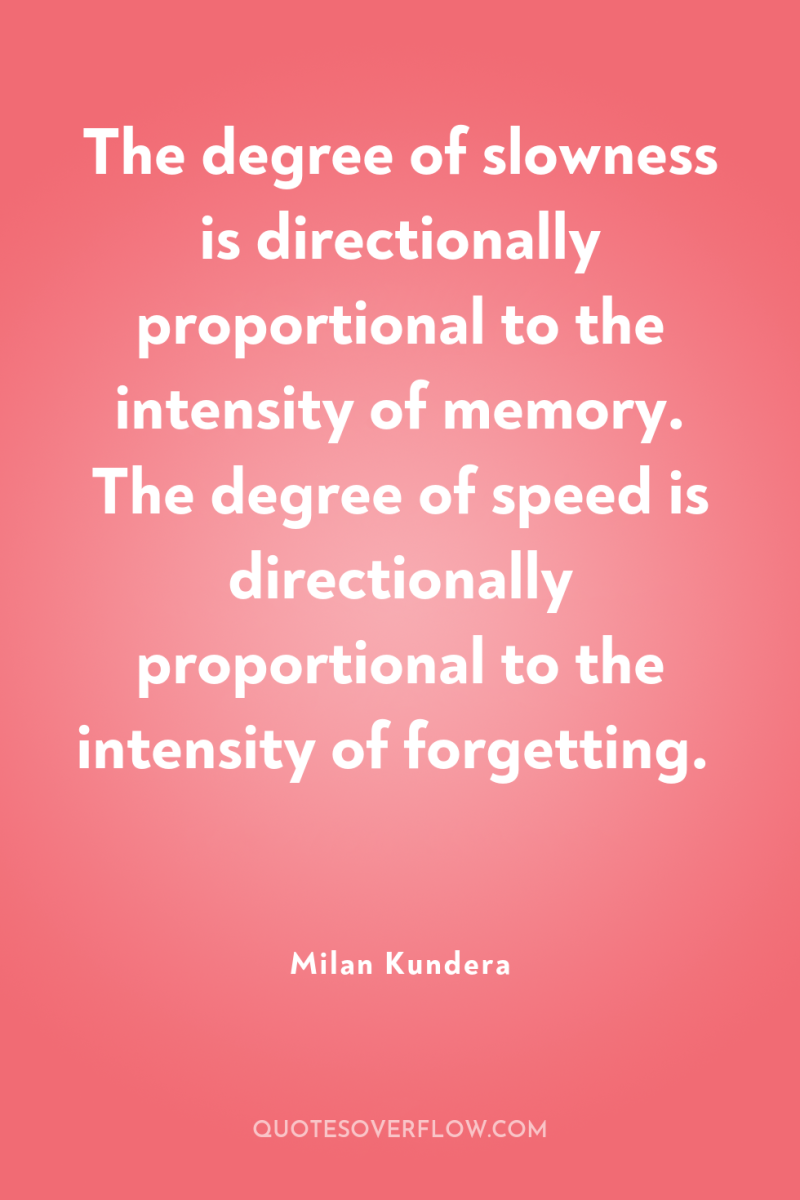
39
The degree of slowness is directionally proportional to the intensity of memory. The degree of speed is directionally proportional to the intensity of forgetting.Milan Kundera
40
The stupidity of people comes from having an answer for everything. The wisdom of the novel comes from having a question for everything.. The novelist teaches the reader to comprehend the world as a question. There is wisdom and tolerance in that attitude. In a world built on sacrosanct certainties the novel is dead. The totalitarian world, whether founded on Marx, Islam, or anything else, is a world of answers rather than questions. There, the novel has no place. .Milan Kundera
41
In Tereza’s eyes, books were the emblems of a secret brotherhood. For she had but a single weapon against the world of crudity surrounding her: the novels. She had read any number of them, from Fielding to Thomas Mann. They not only offered the possibility of an imaginary escape from a life she found unsatisfying; they also had a meaning for her as physical objects: she loved to walk down the street with a book under her arm. It had the same significance for her as an elegant cane from the dandy a century ago. It differentiated her from others.Milan Kundera

42
Great novels are always a little more intelligent than their authors.Milan Kundera
43
A young woman forced to keep drunks supplied with beer and siblings with cleanunderwear–instead of being allowed to pursue something higher –stores up greatreserves of vitality, a vitality never dreamed of by university students yawning over theirbooks. (..) The difference between the universitygraduate and the autodidact lies not so much in the extent of knowledge as in theextent of vitality and self-confidence. The elan with which Tereza flung herself into hernew Prague existence was both frenzied and precarious. She seemed to be expectingsomeone to come up to her any day and say, What are you doing here? Go back whereyou belong!.Milan Kundera
44
I understand you, and I shall not attempt to make you change your mind. I am too old to want to improve the world. I have told you what I think, and that is all. I shall remain your friend even if you act contrary to my convictions, and I shall help you even if I disagree with you.Milan Kundera

45
Unlike the puerile loyalty to a conviction, loyalty to a friend is a virtue - perhaps the only virtue, the last remaining one.Milan Kundera
46
Tell me, where in life is there a value that would make us consider suicide uncalled for on principle! Love? Or friendship? I guarantee that friendship is not a bit less fickle than love and it is impossible to build anything on it. Self-love? I wish it were possible.Milan Kundera

47
Today I know this: when it comes time to take stock, the most painful wound is that of broken friendships; and there is nothing more foolish than to sacrifice a friendship to politics.Milan Kundera
48
Brod was a brilliant intellectual with exceptional energy; a generous man willing to do battle for others; his attachment to Kafka was warm and disinterested. The only problem was his artistic orientation: a man of ideas, he knew nothing of the passion for form; his novels (he wrote twenty of them) are sadly conventional; and above all: he understood nothing at all about modern art. Why, despite all this, was Kafka so fond of him? What about you-do you stop being fond of your best friend because he has a compulsion to write bad verse? .Milan Kundera
49
Damn! What did Ansermet, that most faithful friend, know about Stravinsky's poverty of heart? What did he, that most devoted friend, know about Stravinsky's capacity to love? And where did he get his utter certainty that the heart is ethically superior to the brain? Are not vile acts committed as often with the heart's help as without it? Can't fanatics, with their bloody hands, boast of a high degree of "affective activity"? Will we ever be done with this imbecile sentimental Inquisition, the heart's Reign of Terror? .Milan Kundera
50
Hate traps us by binding us too tightly to our adversary. This is the obscenity of war: the intimacy of mutually shed blood, the lascivious proximity of two soldiers who, eye to eye, bayonet each other.Milan Kundera
51
Encouraged by her parents’ applause, the girl went on: “Do you think we take off our tops to give you pleasure? We do it for ourselves, because we like it, because it feels better, because it brings our bodies nearer to the sun! You’re only capable of seeing us as sex objects! ” Again Papa and Mama Clevis applauded, but this time their bravos had a somewhat different tone. Their daughter’s words were indeed right, but also somewhat inappropriate for a fourteen-year-old. It was like an eight-year-old boy saying: “If there’s a holdup, Mama, I’ll defend you.” Then too the parents applaud, because their son’s statement is clearly praiseworthy. But since it also shows excessive self-assurance, the praise is rightly shaded by a certain smile. With such a smile the Clevis parents had tinged their second bravos, and their daughter, who had heard that smile in their voices and did not approve of it, repeated with irritated obstinacy: “That’s over and done with. I’m not anybody’s sex object.” Without smiling, the parents merely nodded, not wanting to incite their daughter any further. Jan, however, could not resist saying:“ My dear girl, if you only knew how easy it is not to be a sex object.” He uttered these words softly, but with such sincere sorrow that they resounded in the room for a long while. They were words difficult to pass over in silence, but it was not possible to respond to them either. They did not deserve approval, not being progressive, but neither did they deserve argument, because they were not obviously against progress. There were the worst words possible, because they were situated outside the debate conducted by the spirit of the time. They were words beyond good and evil, perfectly incongruous words.Milan Kundera
52
It is precisely when their interior worlds change shape that Bezukhov and Bolkonsky are confirmed as individuals; that they surprise; that they make themselves different; that their freedom catches fire, and with it the identity of their selves; these are moments of poetry: they experience them with such intensity that the whole world rushes forward to meet them with an intoxicating parade of wondrous details. In Tolstoy, man is the more himself, the more an individual, when he has the strength, the imagination, the intelligence, to transform himself. By contrast, the people I see changing their attitude toward Lenin, Europe, and so on expose their nonindividuality. This change is neither their own creation nor their own invention, not caprice or surprise or thought or madness; it has no poetry; it is nothing but a very prosaic adjustment to the changing spirit of History. That is why they don't even notice it; in the final analysis, they always stay the same: always in the right, always thinking what, in their milieu, a person is supposed to think; they change not in order to draw closer to some essential self but in order to merge with everyone else; changing lets them stay unchanged. Another way of expressing it: they change their mind in accordance with the invisible tribunal that is also changing its mind; their change is thus simply a bet on what the tribunal will proclaim to be the truth tomorrow.Milan Kundera
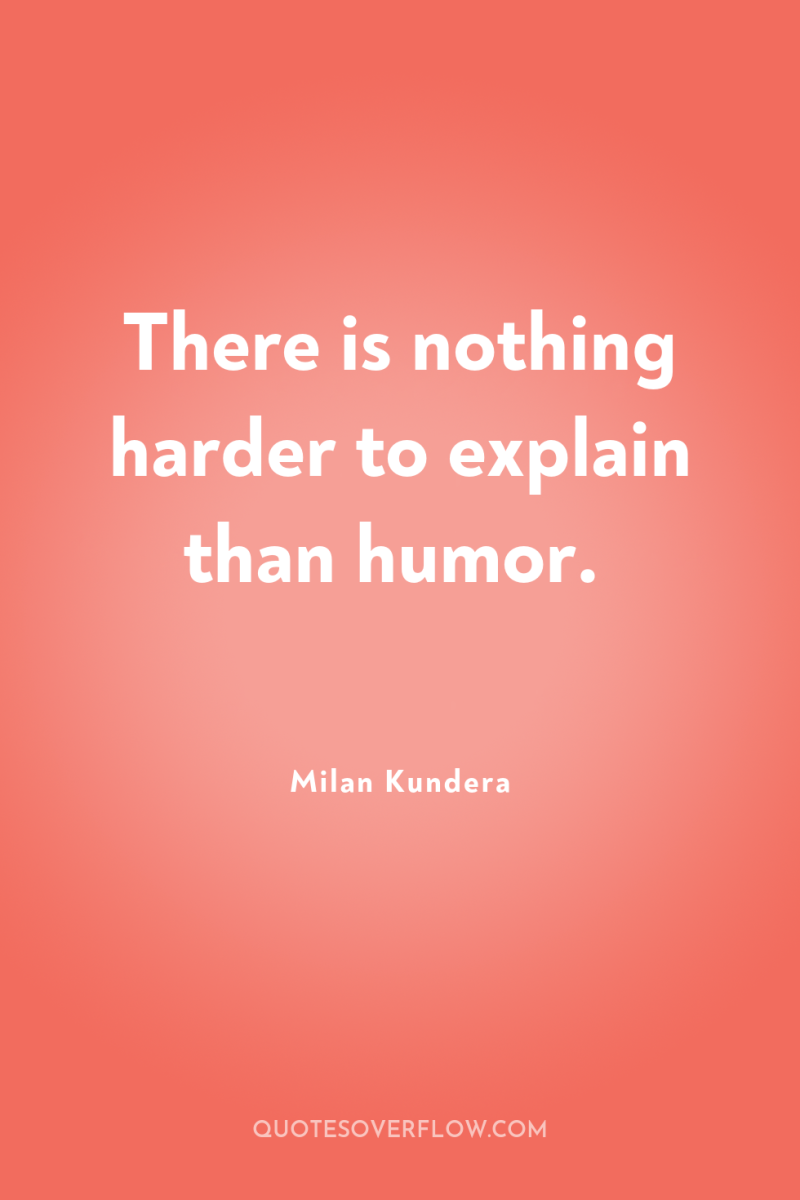
53
There is nothing harder to explain than humor.Milan Kundera
54
Humor: the divine flash that reveals the world in its moral ambiguity and man in his profound incompetence to judge others; humor: the intoxicating relativity of human things; the strange pleasure that conies of the certainty that there is no certainty. But humor, to recall Octavio Paz, is "the great invention of the modern spirit." It has not been with us forever, and it won't be with us forever either. With a heavy heart, I imagine the day when Panurge no longer makes people laugh.Milan Kundera
55
People are always shouting they want to create a better future. It's not true. The future is an apathetic void of no interest to anyone. The past is full of life, eager to irritate us, provoke and insult us, tempt us to destroy or repaint it. The only reason people want to be masters of the future is to change the past.Milan Kundera
56
Kitsch is the aesthetic ideal of all politicians and all political parties and movements. Those of us who live in a society where various political tendencies exist side by side and competing influences cancel or limit one another can manage more or less to escape the kitsch inquisition: the individual can preserve his individuality; the artist can create unusual works. But whenever a single political movement corners power, we find ourselves in the realm of totalitarian kitsch.Milan Kundera

57
To rebel against being born a woman seemed as foolish to her as to take pride in it.Milan Kundera
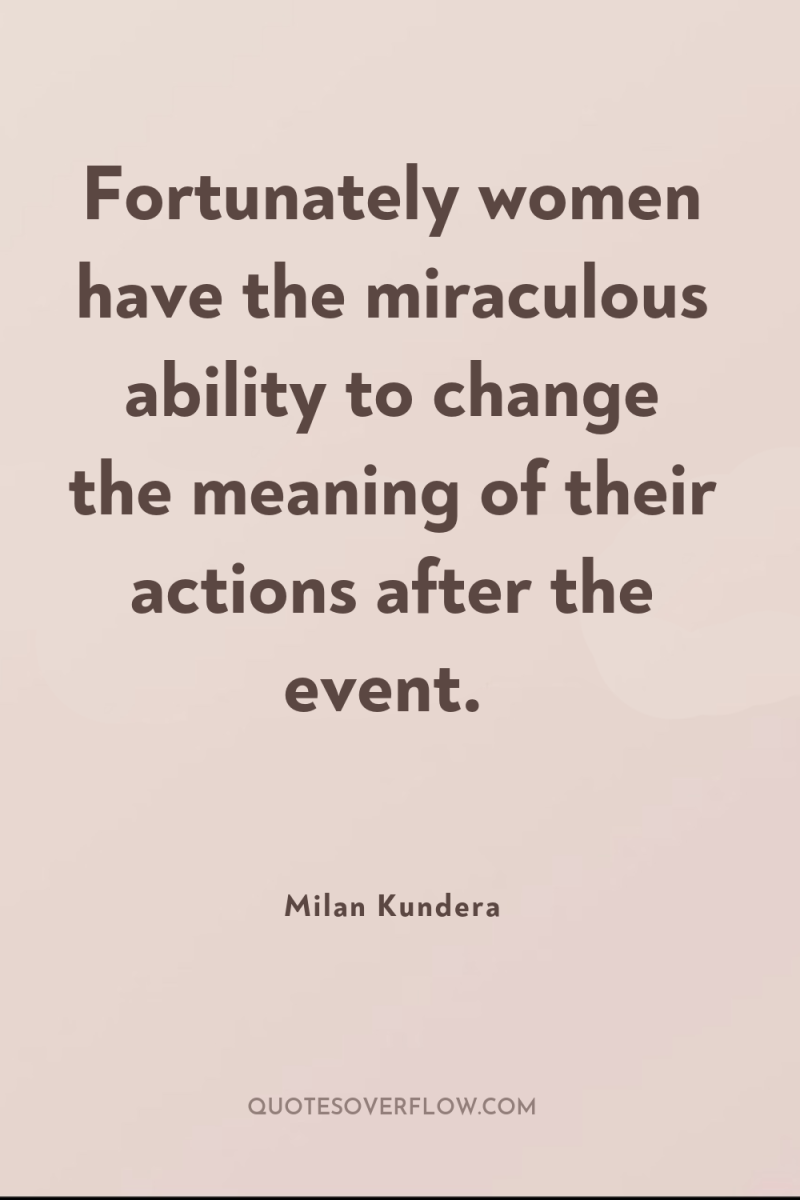
58
Fortunately women have the miraculous ability to change the meaning of their actions after the event.Milan Kundera

59
For he was aware of the great secret of life: Women don't look for handsome men. Women look for men who have had beautiful women. Having an ugly mistress is therefore a fatal mistake.Milan Kundera
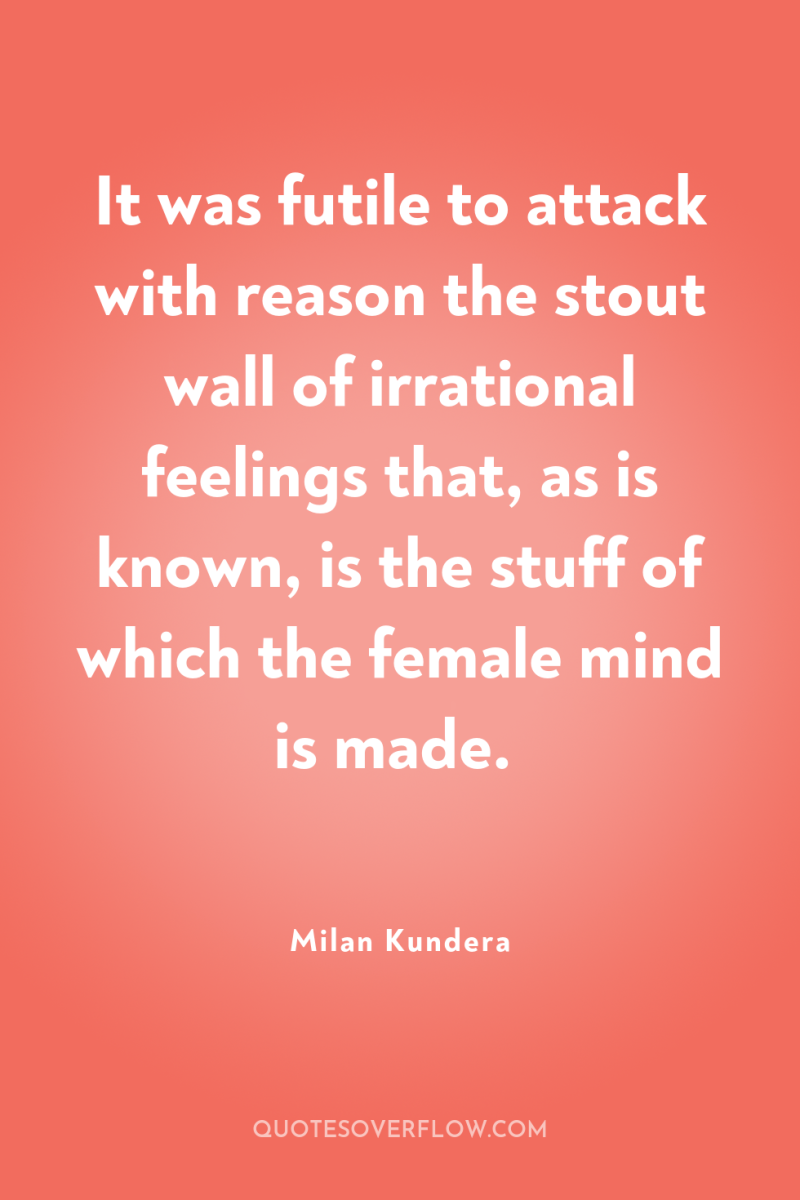
60
It was futile to attack with reason the stout wall of irrational feelings that, as is known, is the stuff of which the female mind is made.Milan Kundera
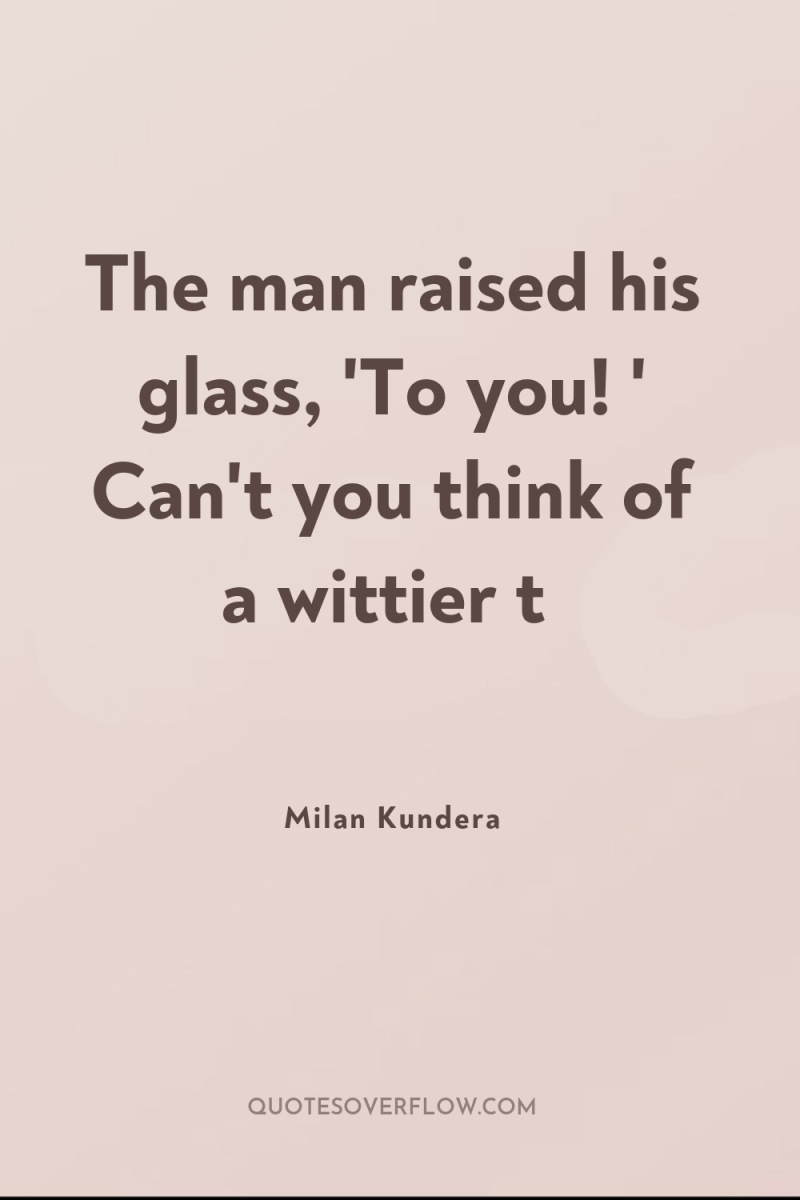
61
The man raised his glass, 'To you! ' Can't you think of a wittier tMilan Kundera
62
She blushed. It is a beautiful thing when a woman blushes; at that instant her body no longer belongs to her; she doesn't control it; she is at its mercy; oh, can there be anything more beautiful than the sight of a woman violated by her own body!Milan Kundera
63
Because misogynists are the best of men.” All the poets reacted to these words with hooting. Boccaccio was forced to raise his voice: “Please understand me. Misogynists don’t despise women. Misogynists don’t like femininity. Men have always been divided into two categories. Worshipers of women, otherwise known as poets, and misogynists, or, more accurately, gynophobes. Worshipers or poets revere traditional feminine values such as feelings, the home, motherhood, fertility, sacred flashes of hysteria, and the divine voice of nature within us, while in misogynists or gynophobes these values inspire a touch of terror. Worshipers revere women’s femininity, while misogynists always prefer women to femininity. Don’t forget: a woman can be happy only with a misogynist. No woman has ever been happy with any of you!.Milan Kundera
64
A mismatched outfit, a slightly defective denture, an exquisite mediocrity of the soul-those are the details that make a woman real, alive. The women you see on posters or in fashion magazines-the ones all the women try to imitate nowadays-how can they be attractive? They have no reality of their own; they're just the sum of a set of abstract rules. They aren't born of human bodies; they hatch ready-made from the computers." ~The Book of Laughter and Forgetting .Milan Kundera
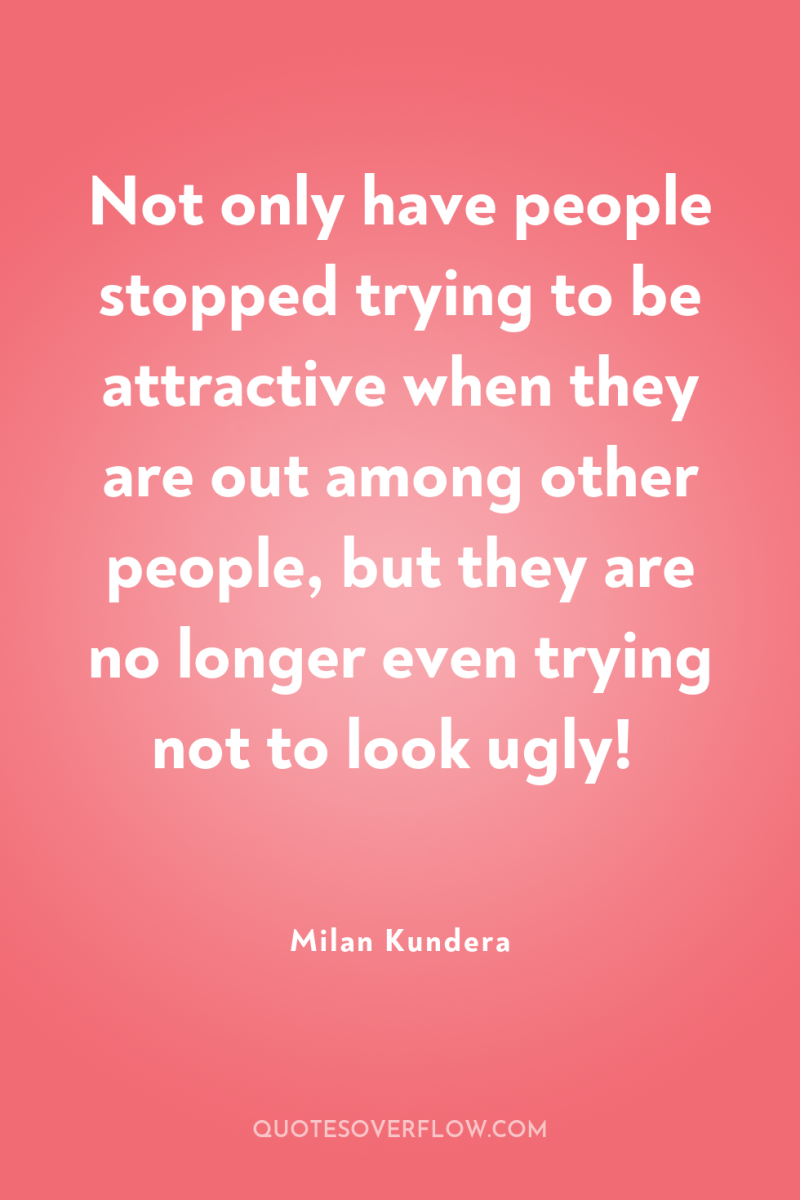
65
Not only have people stopped trying to be attractive when they are out among other people, but they are no longer even trying not to look ugly!Milan Kundera
66
How was she to reconcile men's desire with the desire to be beautiful in their eyes? At first she had tried for a compromise (desperate journeys abroad, where nobody knew her and no indiscretion could betray her); then, later on, she had gone radical and sacrificed her erotic life to her beauty.Milan Kundera
67
Art must always stand guard against stirring emotions that lie outside the aesthetic: sexual arousal, terror, disgust, shock.Milan Kundera
68
No peace is possible between the novelist and the agélaste [those who do not laugh]. Never having heard God's laughter, the agélastes are convinced that the truth is obvious, that all men necessarily think the same thing, and that they themselves are exactly what they think they are. But it is precisely in losing the certainty of truth and the unanimous agreement of others that man becomes an individual. The novel is the imaginary paradise of individuals. It is the territory where no one possesses the truth, neither Anna nor Karenin, but where everyone has the right to be understood, both Anna and Karenin.Milan Kundera
69
No one cares about the artist Kafka, who troubles us with his puzzling aesthetic, because we'd rather have Kafka as the fusion of experience and work, the Kafka who had a difficult relationship with his father and didn't know how to deal with women.Milan Kundera
70
Fortunately, I read (the books) without knowing what I was in for, and the best thing that can ever happen to a reader happened to me: I loved something that, by conviction (or by my nature) I should not have lovedMilan Kundera
71
It takes a very great intelligence to breathe logical meaning into meaningless ideas.Milan Kundera
72
We will never cease our critique of those persons who distort the past, rewrite it, falsify it, who exaggerate the importance of one event and fail to mention some other; such a critique is proper (it cannot fail to be), but it doesn't count for much unless a more basic critique precedes it: a critique of human memory as such. For after all, what can memory actually do, the poor thing? It is only capable of retaining a paltry little scrap of the past, and no one knows why just this scrap and not some other one, since in each of us the choice occurs mysteriously, outside our will or our interests. We won't understand a thing about human life if we persist in avoiding the most obvious fact: that a reality no longer is what it was when it was; it cannot be reconstructed. Even the most voluminous archives cannot help. .Milan Kundera
73
Youth is terrible: it is a stage trod by children in buskins and a variety of costumes mouthing speeches they've memorized and fanatically believe but only half understand. And history is terrible because it so often ends up a playground for the immature; a playground for the young Nero, a playground for the young Bonaparte, a playground for the easily roused mobs of children whose simulated passions and simplistic poses suddenly metamorphose into a catastrophically real reality.Milan Kundera
74
I had all kinds of answers ready for the commissions that called me in and asked me what had made me become a Communist, but what had attracted me to the movement more than anything, dazzled me, was the feeling (real or apparent) of standing near the wheel of history. For in those days we actually did decide the fate of men and events, especially at the universities; in those early years there were very few Communists on the faculty, and the Communists in the student body ran the universities almost single-handed, making decisions on academic staffing, teaching reform, and the curriculum. The intoxication we experienced is commonly known as the intoxication of power, but (with a bit of good will) I could choose less severe words: we were bewitched by history; we were drunk with the thought of jumping on its back and feeling it beneath us; admittedly, in most cases the result was an ugly lust for power, but (as all human affairs are ambiguous) there was still (and especially, perhaps, in us, the young), an altogether idealistic illusion that we were inaugurating a human era in which man (all men) would be neither outside history, nor under the heel of history, but would create and direct it.Milan Kundera
75
Their message will never be decoded, not only because there is no key to it, but also because people have no patience to listen to it in an age when the accumulation of messages old and new is such that their voices cancel one another out. Today history is no more than a thin thread of the remembered stretching over an ocean of the forgotten, but time moves on, and an epoch of millennia will come which the inextensible memory of the individual will be unable to encompass; whole centuries and millennia will therefore fall away, centuries of painting and music, centuries of discoveries, of battles, of books, and this will be dire, because man will lose the notion of his self, and his history, unfathomable, unencompassable, will shrivel into a few schematic signs destitute of all sense.Milan Kundera
76
Their message will never be decoded… because people have no patience to listen to it in an age when the accumulation of messages old and new is such that their voices cancel one another out. Today history is no more than a thin thread of the remembered stretching over an ocean of the forgotten, but time moves on, and an epoch of millennia will come which the inextensible memory of the individual will be unable to encompass; whole centuries and millennia will therefore fall away, centuries of painting and music, centuries of discoveries, of battles, of books, and this will be dire, because man will lose the notion of his self, and his history, unfathomable, unencompassable, will shrivel into a few schematic signs destitute of all sense.Milan Kundera
77
I thought of the fate of Descartes’ famous formulation: man as ‘master and proprietor of nature.’ Having brought off miracles in science and technology, this ‘master and proprietor’ is suddenly realizing that he owns nothing and is master neither of nature (it is vanishing, little by little, from the planet), nor of History (it has escaped him), nor of himself (he is led by the irrational forces of his soul). But if God is gone and man is no longer master, then who is master? The planet is moving through the void without any master. There it is, the unbearable lightness of being.Milan Kundera
78
Therein lies the power of culture: it redeems horror by transforming it into existential wisdom. If the spirit of the trial succeeds in annihilating this century's culture, nothing will remain of us but a memory of its atrocities sung by a chorus of children.Milan Kundera
79
The first step in liquidating a people, ' said Hubl, 'is to erase its memory. Destroy its books, its culture, its history. Then have somebody write new books, manufacture a new culture, invent a new history. Before long the nation will begin to forget what it is and what it was. The world around it will forget even faster.Milan Kundera
80
A meadow is nothing but a field of suffering. Every second some creature is dying in the gorgeous green expanse, ants eat wriggling earthworms, birds lurk in the sky to pounce on a weasel or a mouse. You see that black cat, standing motionless in the grass. She is only waiting for an opportunity to kill. I detest all that naïve respect for nature. Do you think that a doe in the jaws of a tiger feels less horror than you? People thought up the idea that animals don’t have the same capability for suffering as human, because otherwise they couldn’t bear the knowledge that they are surrounded by a world of nature that is horror and nothing but horror.Milan Kundera
81
I say, indeed: "consolation in the nonsentience of nature." For nonsentience is consoling; the world of nonsentience is the world outside human life; it is eternity; "it is the sea gone off with the sun" (Rimbaud).Milan Kundera
82
Dogs are our link to paradise. They don't know evil or jealousy or discontent. To sit with a dog on a hillside on a glorious afternoon is to be back in Eden, where doing nothing was not boring--it was peace.Milan Kundera
83
How would I explain to him that I couldn’t make peace with him? How would I explain that if I did I would immediately lose my inner balance? How would I explain that one of the arms of my internal scales would suddenly shoot upward? How would I explain that my hatred of him counterbalanced the weight of evil that had fallen on my youth? How would I explain that he embodied all the evils in my life? How would I explain to him that I needed to hate him? .Milan Kundera
84
When his wife was at his side, she was also in front of him, marking out the horizon of his life. Now the horizon is empty: the view has changed.Milan Kundera
85
Revolution in Love’. Can you tell me what you mean by that? Do you want free love as against bourgeois marriage, or monogamy as against bourgeois promiscuity?Milan Kundera
86
Of course, these were only dreams. How could a sensible woman leave a happy marriage? All the same, a seductive voice from afar kept breaking into her conjugal peace: it was the voice of solitude.Milan Kundera
87
The history of music is mortal, but the idiocy of the guitar is eternal.Milan Kundera
88
Noise has one advantage. It drowns out words. And suddenly he realized that all his life he had done nothing but talk, write, lecture, concoct sentences, search for formulations and amend them, so in the end no words were precise, their meanings were obliterated, their content lost, they turned into trash, chaff dust, sand; prowling through his brain, tearing at his head. they were his insomnia, his illness. And what he yearned for at that moment, vaguely, but with all his might, was unbounded music, absolute sound, a pleasant and happy all-encompassing, over-poering, window-rattling din to engulf, once and for all, the pain, the futility, the vanity of words. Music was the negation of sentences, music was the anti-word! .Milan Kundera
89
As early as 1930 Schoenberg wrote: "Radio is an enemy, a ruthless enemy marching irresistibly forward, and any resistance is hopeless"; it "force-feeds us music. regardless of whether we want to hear it, or whether we can grasp it, " with the result that music becomes just noise, a noise among other noises. Radio was the tiny stream it all began with. Then came other technical means for reproducing, proliferating, amplifying sound, and the stream became an enormous river. If in the past people would listen to music out of love for music, nowadays it roars everywhere and all the time, "regardless whether we want to hear it, " it roars from loudspeakers, in cars, in restaurants, in elevators, in the streets, in waiting rooms, in gyms, in the earpieces of Walkmans, music rewritten, reorchestrated, abridged, and stretched out, fragments of rock, of jazz, of opera, a flood of everything jumbled together so that we don't know who composed it (music become noise is anonymous), so that we can't tell beginning from end (music become noise has no form): sewage-water music in which music is dying.Milan Kundera
90
When the heart speaks, the mind finds it indecent to object.Milan Kundera
91
A small nation resembles a big family and likes to describe itself that way. In the language of the smallest European people, in Icelandic, the term for "family" is fjölskylda; the etymology is eloquent: skylda means "obligation"; fjöl means "multiple." Family is thus "a multiple obligation." Icelanders have a single word for "family ties": fjölskyldubönd: "the cords (bönd) of multiple obligations." Thus in the big family that is a small country, the artist is bound in multiple ways, by multiple cords. When Nietzsche noisily savaged the German character, when Stendhal announced that he preferred Italy to his homeland, no German or Frenchman took offense; if a Greek or a Czech dared to say the same thing, his family would curse him as a detestable traitor.Milan Kundera
92
If we cannot accept the importance of the world, which considers itself important, if in the midst of that world our laughter finds no echo, we have but one choice: to take the world as a whole and make it the object of our game; to turn it into a toyMilan Kundera
93
She admired her passion, knowing that passion is by definition excessive.Milan Kundera
94
Between the approximation of the idea and the precision of reality there was a small gap of the unimaginable, and it was this hiatus that gave him no rest.Milan Kundera
95
I also think of those daily slaughters along the highways, of that death that is as horrible as it is banal and that bears no resemblance to cancer or AIDS because, as the work not of nature but of man, it is an almost voluntary death. How can it be that such a death fails to dumbfound us, to turn our lives upside down, to incite us to vast reforms? No, it does not dumbfound us, because like Pasenow, we have a poor sense of the real, and in the sur-real sphere of symbols, this death in the guise of a handsome car actually represents life; this smiling death is con-fused with modernity, freedom, adventure, just as Elisabeth was con-fused with the Virgin. This death of a man condemned to capital punishment, though infinitely rarer, much more readily draws our attention, rouses passions: confounded with the image of the executioner, it has a symbolic voltage that is far stronger, far darker and more repellent. Et cetera. Man is a child wandering lost–to cite Baudelaire`s poem again–in the "forests of symbols."( The criterion of maturity: the ability to resist symbols. But mankind grows younger all the time.) .Milan Kundera
96
He had come to find out that reality was more than a dream, much more than a dream!Milan Kundera
97
The religion of orgasm: utilitarianism projected into sex life; efficiency versus indolence; coition reduced to an obstacle to be got past as quickly as possible in order to reach an ecstatic explosion, the only true goal of love-making and of the universe.Milan Kundera
98
She knew that there were all kinds of ways to make a conquest and that one of the surest roads to a woman's genitals was through her sadness.Milan Kundera
99
As she uttered the words of the prayer, she glanced up at him as if he were God Himself. He watched her with growing pleasure. In front of him was kneeling the directress, being humiliated by a subordinate; in front of him a naked revolutionary was being humiliated by prayer; in front of him a praying lady was being humiliated by her nakedness. This threefold image of degradation intoxicated him and something unexpected suddenly happened: his body revoked its passive resistance. Edward was excited! As the directress said, 'And lead us not into temptation, ' he quickly threw off all his clothes. When she said, 'Amen, ' he violently lifted her off the floor and dragged her onto the couch.Milan Kundera
100
And she realized that she (her soul) was not at all involved, only her body, her body alone. The body that had betrayed her and that she had sent out into the world among other bodies.Milan Kundera